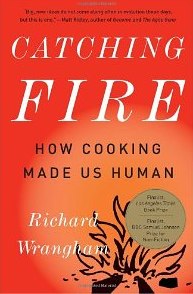Catching Fire: How Cooking Made Us Human
by Richard Wrangham
A pleasant reconstruction of what we know about everyday life in the Pliocene, this small book offers a compelling argument that one key (and very early) driver of the transition from apes to people was the discovery of cooking. The effects of cooking on the diet of Homo Habilis would have been profound. Instead of dedicating 6 hours a day to chewing, as monkeys do, the cooking ape was free to explore hunting, honey-finding, and all sorts of other pursuits. Even if the big one got away, you could come back for a home-cooked meal which you could eat before dark or by firelight. That meal would be a lot easier to digest than raw foods are, and so the cooking ape could make an early night of it and be ready at dawn to go gamble some more. Wrangham sometimes pounds his points to splinters, piling on facts long after we’re as convinced as the necessarily-thin evidence will permit. I was surprised that there’s no discussion of protein evolution or DNA sequencing, and wish I knew whether it was omitted because there is none or because it was thought to be too technical for the projected audience.
